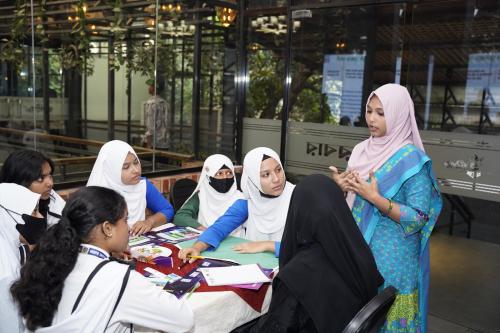

9:30 am EST - 11:00 am EST
Past Event
On November 19, the Center for Universal Education (CUE) at Brookings brought together experts in a webinar to discuss the role of nonstate actors working in partnership with governments to address crises affecting education. First, stakeholders surrounding the Liberian Education Advancement Program (LEAP), including from the Liberian Ministry of Education and Rising Academy, shared their experiences with the program during both the Ebola and COVID-19 crises. Next, representatives from the United Nations High Commissioner for Refugees, Escuela Nueva Foundation, and the Education Outcomes Fund provided a variety of perspectives on the role of public-private partnerships to ensure quality education delivery at times of crises.
Watch the whole conversation here and read the highlights below.
The COVID-19 crisis presented an enormous shock to the traditional model of education delivery, with 90 percent of the global student population out of school at its peak. Children in low-income or fragile settings are left more exposed, with less than a quarter of students in low-income settings having access to remote learning, as compared to 90 percent in high-income settings. With disruptions of this magnitude, innovation and collaboration—for example, through public-private partnerships (PPPs)—are vital to the education sector’s response and recovery.
The LEAP program in Liberia is one of the most well-known PPPs in education in a developing country to date. Conceived as a response to the disruptions in education from the Ebola crisis and Liberia’s civil wars, the program allows the government to partner with nonstate actors to help integrate their educational and management solutions to improve outcomes in the public school system. The Honorable Deputy Education Minister Da-Thong shared that it acts as an “innovation lab,” applying new approaches in education to the LEAP schools that can then be extended to the entire school system if proven successful. Overall, LEAP has helped reshape how education is provided in Liberia, incorporating an emphasis on innovation and creativity to improve the quality of education delivery and learning outcomes throughout the national school system.
However, panelists noted some challenges that have been identified with the program in the past. In particular, issues of child safety, program cost, and mixed learning performance demonstrated by an independent evaluation were noted. While the results after one year of implementation were promising overall in terms of learning gains, a follow-up study two years later showed that learning gains remained positive and statistically significant (with substantial variation across program providers in both evaluations) but did not increase relative to the first year as expected by the researchers. The panelists noted that a number of measures were taken in response to the research findings: Only high performing partners remained in the program; policies were implemented to protect child safety across the Liberian school system; and the Ministry of Education reduced the cost per child of attending the LEAP schools by about 70 percent between year 1 and year 4.
The panelists emphasized the important role of partnerships in developing crisis-necessary solutions for vulnerable children. First, nonstate providers can contribute their own expertise in deploying context-specific solutions to address distance learning and other education-based challenges. Charlotte Berquin from the United Nations High Commissioner for Refugees (UNHCR) mentioned that effective partnership depends upon coordination, complementarity, and communication to ensure a holistic response while putting country ownership at the center of the response. The role of PPPs can also extend to the funding dimension of education programs. Jared Lee of the Education Outcomes Fund discussed the results-based financing model as a unique opportunity to act quickly through a more flexible funding structure where funding is attached to the achievement of learning outcomes. Going forward, nonstate partnerships could allow governments to cultivate the types of skills necessary to address future crises, including strengthening problem-solving, adaptive management, and collaboration skills.
The COVID-19 pandemic necessitated that governments act quickly to respond to challenges occurring in real time. Under such circumstances, more flexible delivery models can act as “innovation labs” for testing different approaches that nonstate actors can bring. For instance, Hon. Minister Da-Thong and Hon. Gbovadeh Gbilia, head of the Education Delivery Unit at the Ministry of Education, shared that Liberia set itself apart from other countries by moving quickly to innovate a national learn-by-radio program for distance learning, which was ultimately replicated by several other countries. More broadly, the panelists emphasized that failure is not exclusively bad—the key is to learn from mistakes throughout the process and to adjust in real time in order to deliver models best suited for the recipients’ needs.
Finally, the COVID-19 pandemic provides an enormous opportunity to build stronger systems equipped to confront future crises. New, innovative approaches were developed during the pandemic that now should be sustainably integrated into planning and delivery for future educational models. For instance, according to Vicky Colbert of the Escuela Nueva Foundation, the pandemic demonstrated that, above all else, learning is an activity and not a place. For instance, efforts in Liberia to integrate the audio programs, which were initially generated for distance learning, into school curriculums will allow students to receive more comprehensive instruction both at home and in the school building in the future. Second, the COVID-19 pandemic emphasized the necessity to build back with a focus on inclusivity and data-based approaches. As children were affected by the crisis to different extents, George Cowell from Rising Academy mentioned that an inclusive recovery must include baseline testing when students return to classrooms, as well as programs to ensure that children catch up, and should put students’ well-being at the front and center.
The webinar featured speakers including:

Emily Gustafsson-Wright, Ema Eguchi, Elyse Painter, Victoria Arciniegas Gomez, Leydi Maldonado
June 30, 2025

Jennifer L. O’Donoghue, Christine Apiot Okudi, Ellen Chigwanda, Adefunke O. Ekine, Dasmine Kennedy, Joyce Kinyanjui, Pamhidzayi Berejena Mhongera, Sumbal Naveed, Mary Otieno, Jamila Razzaq, Atenea Rosado-Viurques, Nasrin Siddiqa, Tran Thi Ngoc Tran
June 30, 2025

Jennifer L. O’Donoghue
June 30, 2025